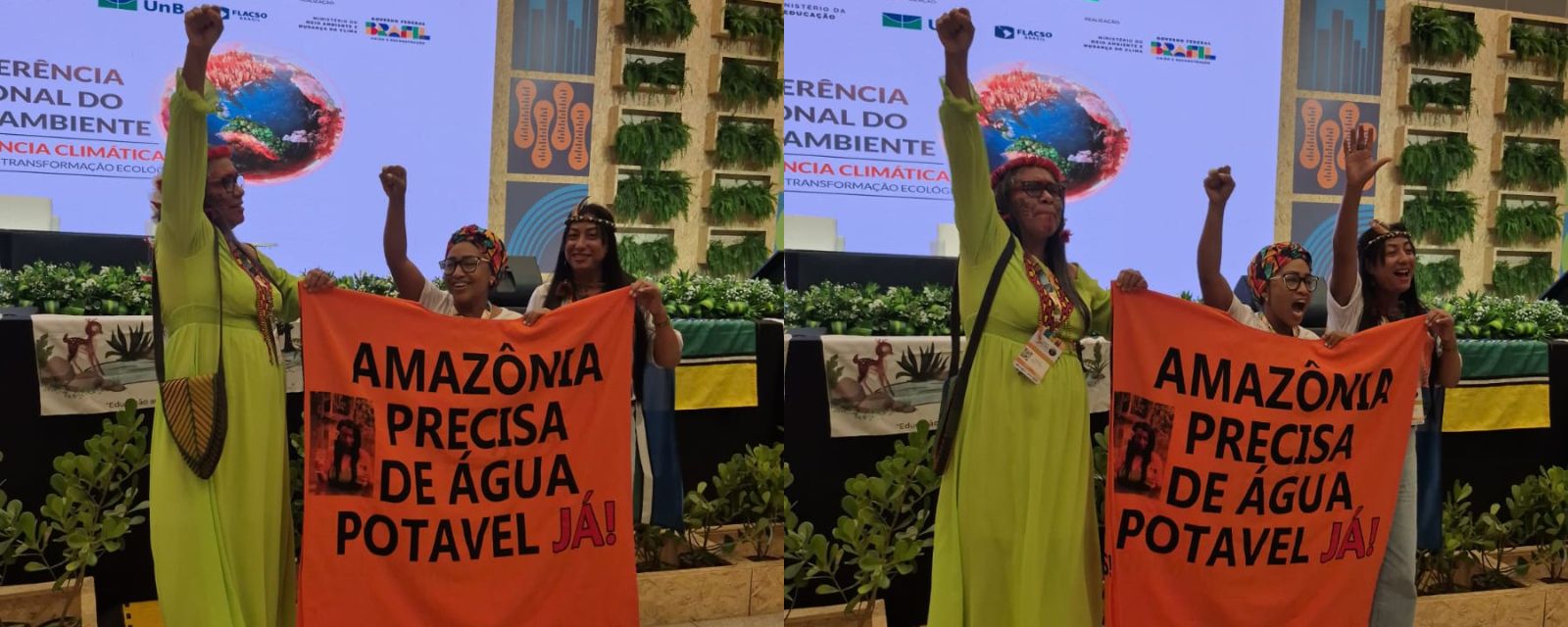Indigenous women make appeal for potable water in the Amazon
07 de May de 2025

By Ana Cláudia Leocádio – From Cenarium
BRASÍLIA (DF) – Indigenous women Ana Pires and Wanda Pororoca, from the Gabili Marworno people in Amapá, participated in the 5th National Environment Conference on Wednesday, May 7, in Brasília. They brought the appeal for potable water in the Amazon, a region surrounded by water, but that neglects this service for its inhabitants.
“We don’t have schools, we don’t have the right to education, health. It’s sad, not even potable water. People don’t understand that having water in the Amazon doesn’t mean the water is drinkable. Most diseases come from this, and we need potable water in the Amazon,” said Ana Pires.
The indigenous woman also highlights that she represents an entire generation that was not heard and that she came to the conference to do her part. “I don’t know if they will listen to us, but my cry is here. In my generation, what I needed didn’t happen, but I did my part. I am fighting for future generations. I don’t know if I will succeed in my generation, but I’m fighting and warning and shouting about it,” she declared.
The Ministry of the Environment and Climate Change (MMA) is resuming the holding of the Conference after almost 12 years of interruption. This year, the chosen theme was “Climate Emergency: The Challenge of Ecological Transformation”, in preparation for the United Nations Climate Change Conference (COP30), which will be held in November in the city of Belém, Pará.
A total of 1,500 delegates are participating, and they are expected to discuss 539 proposals presented during local conferences, which will be synthesized into 100 by the end of the meeting, which concludes on Friday, May 9, at the International Convention Center of Brazil (CICB).
See the groups that will discuss the proposals in the five axes:
Mitigation
- Sustainable Agriculture and Agroforestry Systems
- Recovery and Reforestation
- Environmental Management and Combating Deforestation
- Waste, Emissions, and Decarbonization
- Energy, Infrastructure, and Sustainable Economy
- Technology, Innovation, and Bioeconomy
- Mobility, Sanitation, and Water Management
Adaptation and Disaster Preparedness
- Urban Planning and Infrastructure
- Contingency Plans and Risk Management
- Budget Fund and Climate Financing
- Risk Monitoring and Mapping
- Community Engagement and Civil Defense
- Recovery and Reforestation
- Technology and Capacity Building
- Urban Drainage and Green Areas
- Water Management and Legislation
Climate Justice
- Family Farming and Basic Sanitation
- Public Health and Popular Participation
- Social Actors and Traditional Communities
- Territorial Rights and Land Regularization
- Solidarity Economy and Vulnerable Populations
- Counterpart, Socioenvironmental Compensation
- Environmental Responsibility
- Health, Education, and Food Security
- Social Participation and Human Rights
- Traditional and Indigenous Peoples
Ecological Transformation
- Agroecology and Family Farming
- Agroecological Transition
- Waste Management and Circular Economy
- Sustainable Infrastructure
- Legislation and Climate Policies
- Mobility and Urban Planning
- Natural Resources
- Technology and Innovation
- Energy Transition
Governance and Environmental Education
- Formal Environmental Education
- Public Policies, Professional Training, and Environmental Governance
- Community Environmental Education, Traditional Knowledge, and Sustainable Practices
- Governmental and Institutional Structure
- Financing and Environmental Funds
- Environmental Inspection and Monitoring
- Wild and Domestic Animals
- Social Participation and Transparency
- Planning and Public Policies
- Legislation and Climate Policies
- Green Economy and Sustainable Production
- Decentralized Environmental Governance and Climate Policies
- Solid Waste
- Environmental Preservation and Recovery
- Technology, Research, Innovation, and Development
- Traditional Knowledge, Local, and Vulnerable Communities

